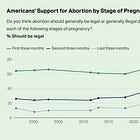The Year in Abortion: Polling & Democracy
The short version? America is pro-choice & Republicans know it
“The Year in Abortion: Polling and Democracy” is the first article in a multi-part series examining abortion rights in 2023. Please be on the lookout for more emails from me through the end of the year.
There are two words that come up again and again when I think about the last year in abortion rights: overwhelm and suffering. The overwhelm is deliberate: With every new ban, lawsuit and attack, Republicans believe they’re inundating us into inaction. (That’s part of the reason I started the newsletter—to provide some order to the Republican-led chaos.) The suffering, too, was expected, though conservatives will claim otherwise. But let’s be real: the anti-abortion movement had 50 years to plan for this moment, and they knew what the consequences would be.
What Republicans didn’t plan for, though, was Americans’ response to the nightmare. They didn’t expect poll after poll—even in red states—showing broad and growing support for abortion rights.
So over the next few days, as I take you through the top abortion rights stories and trends of 2023, remember that: for all the horror, the GOP is on their heels. While that doesn’t weaken the impact of their policies or the harm they cause, it should give us reason to hope. And at the moment, that’s something we all need.
America Supports Abortion
If anything became clear this year, it’s that voters overwhelmingly want abortion to be legal. Not only is support for abortion rights the highest its been in history (even in red states)—but support for abortion throughout pregnancy is also growing rapidly.
And while Republicans try to convince the public that most Americans want some sort of abortion rights ‘middle ground’, the truth is far more pro-choice.
For example, the GOP has been pushing a 15-week national ban by pointing to Gallup numbers showing that support for abortion rights drops after the first trimester—from 69% to 37%. But what Republicans and the anti-abortion movement don’t like to talk about is that support for abortion after the first trimester has jumped by nearly 10 points in the last few years:
In 2018, only 28% of Americans supported abortion in the second trimester—now 37% do. And while 13% of voters in 2018 supported abortion in the third trimester, now 22% do.
Those numbers only get more stark when you look at American women and young people: 25% of women and 33% of 18-34 years old believe abortion should be legal throughout pregnancy.
We saw similar support in a poll from PerryUndem: When voters were given the choice between a ballot measure that included a ‘viability’ restriction and one that didn’t, respondents were 15 percentage points more likely to choose the measure without the viability standard.
Tresa Undem, a co-founder of PerryUndem, said that while even five years ago people supported a viability mandate, today, “People are saying, ‘I don’t want the government involved in this at all.’”
This is so important as we look to new polling in 2024. As Erika Christensen of Patient Forward wrote in her guest column this week, we need to think differently about how we’re framing questions to voters:
“It shouldn’t be about when the government is involved in pregnancy, but about if the government should be involved at all.”
When you ask Americans about abortion this way, you get more telling answers: An ABC News/Washington Post poll in May, for example, showed that 78% of Americans believe the decision whether to have an abortion should be left to a woman and her doctor.
Still, regardless of how they were asked, Americans supported abortion rights again and again in 2023, in poll after poll. In November, a poll from The Wall Street Journal found that 55% of voters want abortion legal “for any reason.” (That includes one third of Republicans—more on this in a moment.) Also this year, Pew found that 62% of Americans 30-49 years old believe abortion should be legal in all or most circumstances, and that 73% of 18-29 year olds think the same.
As you can see—the trend among young people is really, really promising. In fact, Harvard University's Institute of Politics found that young people 18-29 years old are twice as likely to describe themselves as ‘pro-choice’ than as ‘pro-life.’
To put it all simply: Americans are starting to understand that pregnancy is too complicated to legislate, and the rising generation knows this better than anyone.
Republicans really don’t want people to know any of this. They realize that how your friends and neighbors feel about an issue impacts your own beliefs. Essentially, the more that voters understand how pro-choice the country is, the easier it is for them to feel comfortable thinking the same.
And by the way: The 15-week ban that Republicans keep insisting is the ‘compromise’ Americans want? A New York Times-Siena College poll in August found that a 15-week abortion ban is just as unpopular as a 6-week ban. And another poll reported that Americans reject the notion that 15-week bans are ‘reasonable compromises’ by a more than 2-to-1 margin. So, ha!
For details on multiple polls, check out this election day column:
The other reason the GOP is panicking over polls is that they’re losing Republican voters on abortion rights, too. A Reuters/Ipsos poll in September, for example, showed that one in three Republicans reported believing Democrats’ stance on abortion was the best approach on the issue. And a poll from PBS NewsHour/NPR/Marist found that two-thirds of Americans—including a majority of Republicans—oppose banning abortion medication.
The same is true when you ask Republican voters about enshrining abortion rights in their state constitutions; we’re seeing serious numbers. In an August Navigator poll showing that 2 in 3 Americans would vote to codify abortion rights, that number included nearly half of Republicans!
FiveThirtyEight also reports that conservatives are increasingly more supportive of abortion rights since Dobbs, and it’s clear that Republicans in red states have become increasingly uncomfortable with extremist bans. Recent polling out of Tennessee, for example, found that 65% of Republicans want to see the state ban made less harsh—as did 56% of those who identified as conservatives, and 54% who identified as Evangelical. Those are incredible numbers!
The ABC News/Washington Post poll I mentioned that showed Americans believe abortion is a decision best left to a woman and her doctor? Fifty eight percent of Republicans agreed, as did 60% of self-identified conservatives, 56% of white Protestants, and 75% of Catholics.
What’s more, these numbers may be translating on election days: Nearly 1 in 4 white evangelicals voted to support Ohio’s Issue 1.
Given all these very clear polls, you won’t be surprised by the next 2023 abortion rights trend: Republicans’ willingness to undermine democracy in order to ban abortion.
Attacks on Democracy
Since Americans are overwhelmingly pro-choice and only becoming more so, Republicans are intent on stopping voters from having a say on the issue. They know that when abortion is on the ballot, abortion wins. (As I noted earlier, most Americans would codify abortion rights into their state constitutions—including nearly half of Republicans.)
That’s why one of the year’s biggest abortion rights stories has been the GOP’s incessant attacks on democracy. Republicans in multiple states have spent a whole a lot of time, energy and money stalling or stopping abortion rights ballot measures—even if it means undoing democracy in the process.
They’ve focused on in on several key tactics: Raising ballot measure standards, including increasing the percent of votes necessary to pass an amendment, as well as mandating that petitioners gather signatures from a greater number of counties. (That kind of standard would allow one small conservative county to veto an amendment that the vast majority of the state wants.) The idea, of course, is to make it as hard as possible for citizen groups to get an amendment in front of voters.
Republicans have also been rewriting ballot summaries to include false or misleading language as a way to trick voters out of supporting pro-choice amendments. In Ohio, for example, the language that people saw when they went to vote on Issue 1 wasn’t from the pro-choice amendment itself. Instead, it was a biased summary written by the Republican Secretary of State Frank LaRose. (Which, incredibly, was even longer than the actual amendment!)
Republicans have used other tactics, too: In Missouri, the Republican Attorney General refused to sign off on a cost estimate for a pro-choice ballot measure, claiming that restoring abortion rights would cost the state billions of dollars. And Florida’s Attorney General is petitioning the state Supreme Court to reject an abortion rights amendment because of its language on ‘viability’.
What’s more, these lawmakers and GOP leaders are often working with anti-abortion groups to stop pro-choice measures. LaRose in Ohio, for example, outright admitted that he was getting input and advice from major national anti-choice groups on how to word his Issue 1 ballot summary.
What’s also frustrating is that these Republican leaders continually claim that their efforts have nothing to do with abortion—they say they’re simply trying to protect their state constitutions from out-of-state special interests. It’s only recently that some have admitted the truth.
Read more about Republican attacks on democracy in this March column, and the below article:
But attacks on democracy this year went beyond ballot measures. After pro-choice judge Janet Protasiewicz won a state Supreme Court seat in Wisconsin, for example, Republicans threatened to remove her from cases where they said she was ‘biased’—and to impeach her if she refused to recuse herself. In North Carolina, Republicans passed an abortion ban by using a Democrat who switched parties—and her abortion stance—just three months after taking office and running a pro-choice campaign. (Some reports indicate Rep. Tricia Cotham was a Republican plant.)
That’s not the only way Republicans used elected officials to implement anti-abortion policies: Texas passed a law this year that allows for the removal of district attorneys who decline to prosecute abortion cases. And in Louisiana, governor-elect Jeff Landry planned to withhold vital funding for New Orleans’ water safety as punishment for not prosecuting abortion providers or patients.
Republicans like this strategy so much that they want to outsource it to other states: In April, for example, fifteen state Attorneys General signed onto an amicus brief arguing that they have the right to remove elected district attorneys from office if they decline to go after abortion cases. (The brief was in support of Florida Gov. Ron DeSantis, who fired a prosecutor when he decided he wouldn’t target abortion ‘crimes’.)
The attacks on local prosecutors aren’t just a sign of how little Republicans think of democracy—but of just how much they want to punish women for abortion. Which leads us to the next abortion rights trend of 2023: Criminalization.








I hate that we are clawing with bloody fingers to retain rights that were too strict to begin with (imo). There is no democracy in America. Not that there ever was! I just.......I don't even know
Republicans are going to keep losing on this issue, which is frankly fine by me. I hope it's the millstone around all their hypocritical necks.